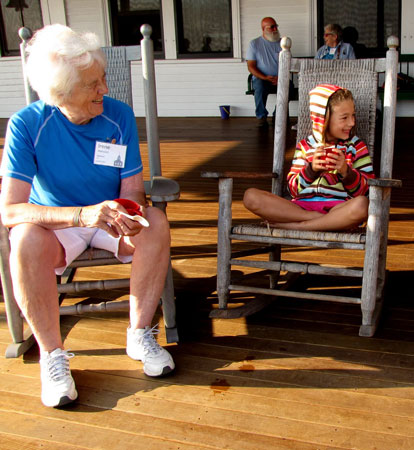Global Compassion: Cohousing is Part of the Movement

I’m back from Star Island off the coast of New Hampshire – a week long intentional community of 300 – where I took a workshop on “global compassion.” I’m personally motivated to help create a society of caring, that puts compassion into action, that can reach across the globe to reduce human suffering, address food and water shortages, heal divides, alleviate climate change – and create joy! I have long advocated that cohousing provides a great environment to facilitate compassion, and by virtue of the values we share – of sustainability, of caring and connection – we are already part of the global compassion movement.
I was struck when reading Ned Noddings “The Challenge to Care in Schools,” promoting a learning environment that teaches children to care for all that they see around them, that adults could benefit from the same! Doesn’t what Noddings advocate sound like cohousing?
**a place we feel welcomed and respected (and I would add safe and secure ideally) – cohousing builds our confidence to allow room for compassion, and nurtures the “calm mind” the Dalai Lama teaches that leads to compassion;
**opportunities to develop caring relationships – cohousing’s culture of caring and sharing is all about relationships;
**information to learn what it means to care for others – cohousing is a learning process for many; we learn from each other how best to be supportive, while respecting our privacy; many of us have put into practice “non-violent communication” and conflict management practices;
**opportunities provided to encourage contribution to our larger community – the 2012 survey of cohousing communities confirmed a high level of civic engagement among cohousers involved in social and environmental justice. Cohousing may attract folks with this proclivity, but our cohousing lifestyle supports its actuality.
Compassion also feels good, and contributes to our health! Empathy is putting compassion into action: wanting to do something to relieve the hardships of others. This desire to help actually gives us energy and a sense of purpose. When we act upon this motivation, we and those around us benefit.
As human beings, we have an instinctive capacity for empathy, which goes beyond our friends and family, and can include an urge to help strangers who are suffering. In the same way, when we witness people, whom we know or not, triumphing over adversity, our instinctive ability to empathize allows us to share the joy. Since we are social animals (and living in community helps us flourish), our capacity for empathy has profound implications for our happiness as well as our health. Science increasingly suggests that a person who is happy and peaceful enjoys health benefits.
Beyond seeking our own happiness, many of us aspire to global compassion, to find commonalities among the peoples of the world to address climate change, reduce violence, to support social justice. As Karen Armstrong promotes, “we urgently need to make compassion a clear, luminous and dynamic force in our polarized world.”
Many of us are overwhelmed: how can we possibly make a difference? We do what we can, and in my case, I am committed to creating more cohousing, which facilitates compassion. How many of our communities are committed to “non-violent communication” practices; to civic engagement outside our neighborhoods; to reducing our carbon footprint which could help alleviate food and water shortages elsewhere in the world?
The May 2017 National Cohousing Conference will profile and celebrate compassion in action through our successful sustainability practices. In the near term, consider joining our Arcosanti Retreat Sept 30-Oct 2 in Arizona, addressing how to deal with diverse personalities – because it’s all about relationships!
For those who want to continue the conversation and exploration of global compassion, let me share some of the resources suggested by Dave Lehman, PhD, founder of Lehman Alternative Community School in Ithaca, New York, in his talk “spreading global compassion.”
*Paul Ekman, “Moving Toward Global Compassion,” Paul Ekman Group, 2014
*His Holiness the Dalai Lama, “Beyond Religion: Ethics for a Whole World,” Houghton Miflin Harcourt, 2011
*Dr. Brene Brown, “Empathy vs Sympathy” TED Talk
*Sebastian Junger, “Tribe: On Homecoming and Belonging,” Hachette Book Group, 2016
*Ned Noddings, “The Challenge to Care in Schools, Teachers College Press,” 2005
*Karen Armstrong, “Twelve Steps to a Compassionate Life,” Anchor Books, 2011, also online at www.charterforcompassion.org
*“Center for Investigating Healthy Minds” at the University of Wisconsin: Madison
*“Center for Compassion and Altruism, Research and Education,” CCARE at Stanford University
*Jeremy Rifkin, “The Empathic Civilization: The Race to Global Consciousness in a World in Crises,” Penguin, 2009
Category: Why
Tags: Conflict Resolution, International, living in cohousing
Views: 891

